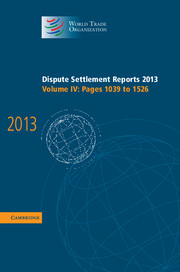Book contents
- Frontmatter
- Contents
- China - Anti-Dumping and Countervailing Duty Measures on Broiler Products from the United States (WT/DS427): Report of the Panel
- China - Countervailing and Anti-Dumping Duties on Grain Oriented Flat-Rolled Electrical Steel from the United States (WT/DS414/2): Award of the Arbitrator
- Cumulative List of Published Disputes
China - Countervailing and Anti-Dumping Duties on Grain Oriented Flat-Rolled Electrical Steel from the United States (WT/DS414/2): Award of the Arbitrator
Published online by Cambridge University Press: 12 December 2017
- Frontmatter
- Contents
- China - Anti-Dumping and Countervailing Duty Measures on Broiler Products from the United States (WT/DS427): Report of the Panel
- China - Countervailing and Anti-Dumping Duties on Grain Oriented Flat-Rolled Electrical Steel from the United States (WT/DS414/2): Award of the Arbitrator
- Cumulative List of Published Disputes
Summary
Arbitration under Article 21.3(c) of the Understanding on Rules and Procedures Governing the Settlement of Disputes
WT/DS414/2
Circulated to Members on 3 May 2013
Request for the Establishment of a Panel by the United States
The following communication, dated 11 February 2011, from the delegation of the United States to the Chairman of the Dispute Settlement Body, is circulated pursuant to Article 6.2 of the DSU.
On September 15, 2010, the United States Government requested consultations with China pursuant to Article 4 of the Understanding on Rules and Procedures Governing the Settlement of Disputes (“DSU”), Article XXII:1 of the General Agreement on Tariffs and Trade 1994 (“GATT 1994”), Article 17.3 of the Agreement on Implementation of Article VI of the General Agreement on Tariffs and Trade 1994 (“AD Agreement”), and Article 30 of the Agreement on Subsidies and Countervailing Measures (“SCM Agreement”). The United States and China held such consultations on November 1, 2010. Unfortunately these consultations did not resolve the dispute.
The United States considers that certain measures of the Government of the People's Republic of China (“China”) are inconsistent with China's commitments and obligations under the GATT 1994, the AD Agreement, and the SCM Agreement. The measures impose countervailing duties and antidumping duties on grain oriented flat-rolled electrical steel (“GOES”) from the United States, and are set forth in Ministry of Commerce of the People's Republic of China (“MOFCOM”) Notice No. 21 [2010], including its annexes.
These measures appear to be inconsistent with the following provisions of the AD Agreement, SCM Agreement, and GATT 1994:
Initiation of the Investigation
1. Articles 11.2 and 11.3 of the SCM Agreement, because:
(a) The application for a countervailing duty investigation failed to contain information reasonably available to the applicant regarding the existence of a financial contribution, a benefit, or specificity for several of the alleged subsidy programs; and
- Type
- Chapter
- Information
- Dispute Settlement Reports 2013 , pp. 1495 - 1500Publisher: Cambridge University PressPrint publication year: 2015



